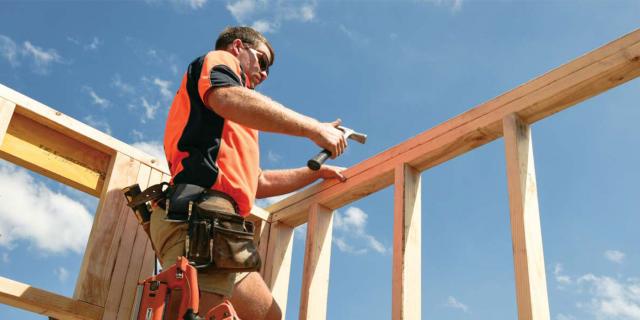Public Liability insurance for builders | Master Builders Insurance Brokers
Having Public Liability insurance is a necessary part of running a business in the building and construction industry. But what exactly does it cover?
Public liability insurance is a common contractual requirement for builders and it is just good commercial practice. But, like most types of insurance, there is no such thing as a standard policy and policies vary significantly in the extent of coverage that is offered by different insurance companies.
It is very important that you ensure the policy you buy suits the needs of your business. The following information can help you to make the right decision.
First, consider the base structure of a public liability policy. The purpose of public liability insurance is to indemnify insured parties for legal liability to third parties for personal injury or property damage arising from an occurrence in connection with the insured business.
Let’s break that down…
- ‘insured parties’ – make sure that all parties that need to be insured by your policy are included. Consider current and past trading entities, subsidiaries, contract principals, subcontractors, consultants or any others.
- ‘for legal liability’ – you must be legally liable for what has occurred. This generally means that you must be at fault or negligent in some way, in causing any damages that are claimed against you.
- ‘to third parties’ – meaning other persons or their property. It does not insure any damages to you or your property as you cannot hold yourself legally liable for causing your own injuries or damages.
- ‘for personal injury or property damage’ – the policy only responds to pay compensation for liabilities arising from these injuries or damages. Pure financial issues like fines for workplace health and safety breaches, contractual disputes and penalties (such as liquidated damages) are not insured. Note: Personal injury does not include your statutory WorkCover obligations.
- ‘from an occurrence in connection with the insured business’ – policy coverage is limited to liabilities in connection with the type of business specified in the policy. Check that your business description is wide enough to cover all that you do. For example, a business description in the policy of ‘builder’ may not be sufficient to include the commercial hiring out of plant items to others (if you do that).
|
|
There is no such thing as a standard Public Liability policy so be sure to understand what you're covered for. |
In addition to the above basic elements, the policy will also include defence costs, which are legal costs and expenses incurred with the consent of the insurer, in defending insured claims and actions against you for personal injury and property damage.
What else does public liability include?
With the previous aspects correctly in place, you should consider policy limitations and amendments or extensions that are available. Remember that standard policies can be quite restrictive and, whilst the following suggestions are not exhaustive, nobody knows your business better than you. If you have a particular need, speak to your insurance broker to establish availability of coverage.
Project specific or annual policy
Project specific insurance is normally not advisable. Occurrences that generate a liability claim can happen at any time and continuous cover under an annual policy delivers the best protection. Also, annual policies are usually more economical than the combined cost of project specific covers over any given period.
Works limitations
Most policies limit the types of works that are insured. Check that any such policy limitations are acceptable to you, particularly in respect of scope and types of works, location, maximum project values or construction periods.
Products liability
Legal actions can arise from personal injuries or property damage that occurs both during construction and after completion. In general terms, public liability relates to claims that occur during construction phase and products liability relates to occurrences post completion or handover.
What are the differences between Public and Products Liability?
Subcontractor liability
The policy should cover your liabilities to subcontractors and their workers (statutory WorkCover may still be required) and also your proportionate liability you may incur from your subcontractors’ actions. At times you may be required under terms of a particular contract to take out public liability insurance for your subbies on a job, so it is a good idea to have your policy automatically extended to do this without having to notify your insurer.
Contract principals
Principals/proprietors/owners in respect of your building contract are normally required to be insured by your policy and should be automatically included.
Contractual obligations
Always check the public liability insurance clauses in all contractual arrangements to the works and ensure you have complied. This should not be limited to the principal contract and particular care should be taken with underlying contracts, such as sheet piling agreements, labour hire and host employer arrangements with group training organisations. Failure to do so could leave you uninsured for significant claims against you.
Vibration
Damage to property that adjoins building sites, caused by vibration, is a regular problem and this is often excluded under standard public liability policies. Check that you are covered for this and any special policy provisions that may be applicable, such as requirements for dilapidation or conditions reports.
Plant items on site
Your policy should allow the use of fixed and mobile plant items on site, such as hoists, unregistered mobile plant and cranes. Registered plant items used as a tool of trade should also be included. Note: Statutory CTP insurance may still be required.
Design works
If you undertake design works for a specific design fee, public liability insurance may not be enough and professional indemnity cover could be needed. Refer these circumstances to your insurance broker to arrange appropriate coverage.
Off-site operations
Liabilities could happen from your conduct of sales, office, workshop, storage, display or other premises and property owned or leased in your business operations. If this is the case, these risks should be incorporated into your policy coverage.
In summary
Whilst this information provides some guidance for arranging your public liability insurance, it is by no means comprehensive. There is no substitute for reading your policy documents and making sure that you have met the insurance provisions of your contracts.
The reality is that different projects and different businesses have different insurance needs, so it makes sense to engage a specialist construction broker, like Master Builders Insurance Brokers, to assist you in getting the right coverage for your business.
Related products




